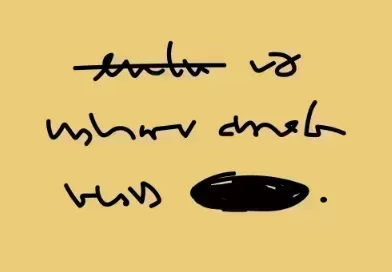〖 A killed darling 〗
Not by the devil but by my fellow mortals.

Kill your darlings
THE EDITORS
Kill your darlings
It’s a cliché, a thing writers supposedly say, or learn to say, to themselves. The imperative also implies the existence of, and need for, an editor. While assembling Issue 2 — and honing the magazine’s voice and the voices in it — we found ourselves gravitating toward tales of editing. As Francesco Pacifico notes in this issue’s essay « How Americans edit sex out of my writing »:
« The editing process might be the real literature. »
So we gathered some darlings from contributors. In print, they can be found here and there, like plots in a garden cemetery, with lamentations, good-riddances or other epitaphs.

☞ Possession, demonic vs. mundane (Preeta Samarasan)
☞ The South Bronx did not exist (Peter L’Official)
☞ Coagulated soy juice (Fernanda Eberstadt)
☞ Odessa conga line (Yamandu Roos)
☞ A can-can dancer performs a Christmas tree (Sarah Watling)
☞ K-pop nostalgia (Mia You)
☞ Dinosaurs + dolphins (Caroline Tracey)
☞ Longing + debt (Irina Dumitrescu)

I experimented with many different beginnings for my novel Tale of the Dreamer’s Son. One of these beginnings had the narrator describing the emotions of the couple in an old wedding portrait. The narrator had never known these people; they were not his own ancestors. In the middle of his detailed description, he addressed the reader directly:
You will notice my prodigious gifts of empathy and extrapolation. Other people pour themselves like so much smoke into my skin. I open my mouth and it is their voices that come out. Call it by its name: possession. Not by the devil but by my fellow mortals. All the fumbling bumbling figures of my personal history.
I liked what this revealed about the narrator: that he was consciously unreliable; that a part of him nevertheless believed every one of his forthcoming accounts of incidents he had never witnessed. But along with my editors, I decided that this entire chapter was not the strongest possible opening for the novel, and that it would be more powerful to begin with one of the most dramatic and crucial moments of the story. I trust that any smart reader will understand — although perhaps a little more gradually — what the narrator is doing, how he bends truth, how he himself believes his version of events that preceded his birth.